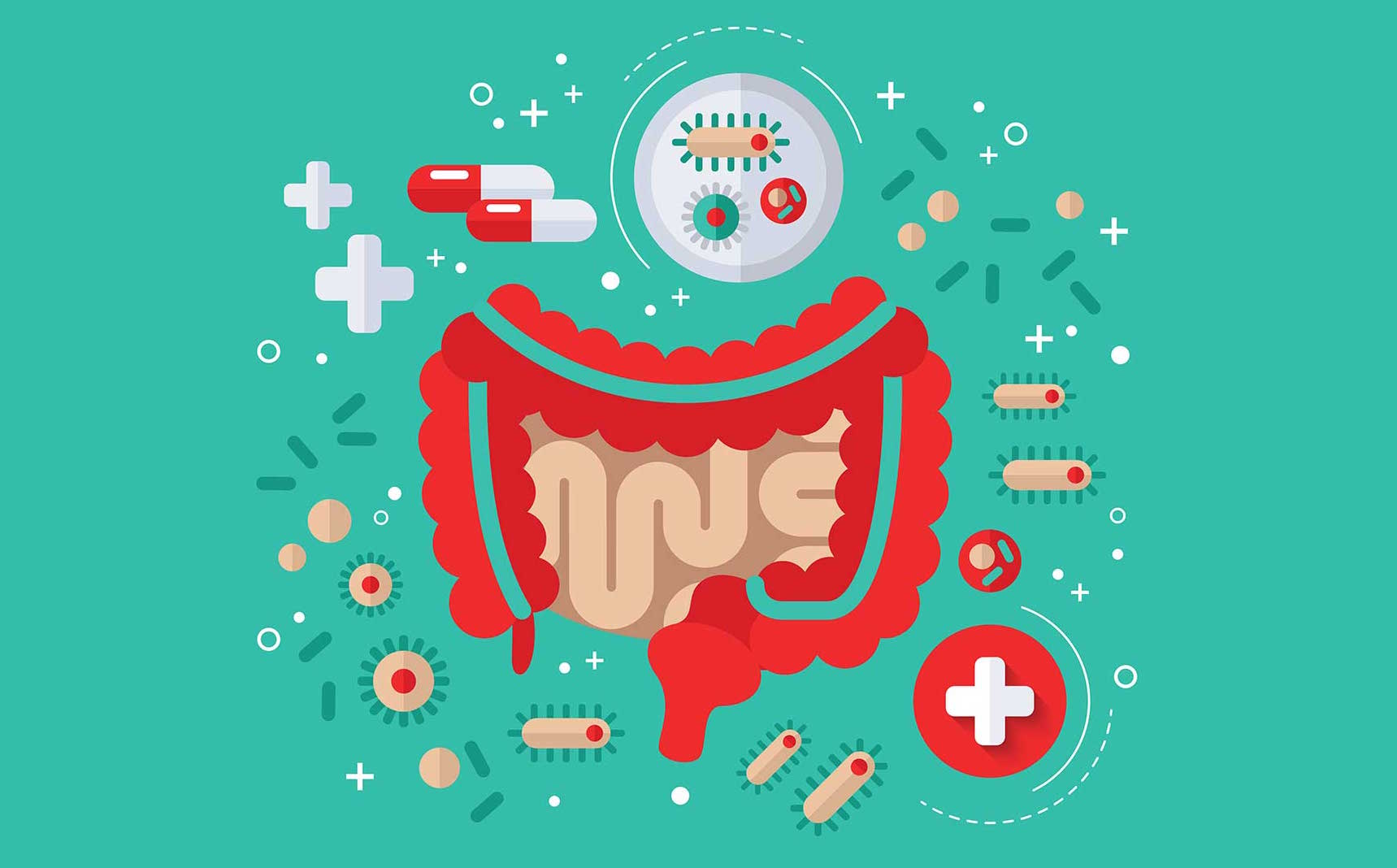It’s a safe bet that most of us know more about the surface of Mars than our own gut health. But all that is changing. The medical world is uncovering more and more about the importance of the ‘gut microbiome.’ That delicate system at the core of each body is now thought to be linked to everything from headaches to heart health.
gut pediatrics
Did you know that abdominal pain is the most commonly reported symptom among kids? It’s not really surprising when you consider these problems are rampant among adults. So what can we do to help the little ones?
cause & effect
“We call ourselves the ‘poop and puke’ docs,” says Dr. Amana Nasir, pediatric gastroenterologist at the Mercy Clinics in Creve Coeur and St. Peters. “The most common issue is stool abnormality. About 40 percent of our kids have constipation that comes from eating foods that do not have enough fiber, not drinking enough water, not being active enough and postponing going to the bathroom because of all the gadgets they have to play with.”
Other issues result from kids eating too much or ingesting things that don’t belong in the gut. “The second big thing I see is reflux,” Nasir says. “They are eating things that cause acid reflux. Then we are seeing food allergies that cause choking and gagging. In the summertime, we see giardia and cryptosporidium infections from baby diapers in swimming pools.”
The stomach and bowel take a beating during childhood when stress is internalized. “It is called functional abdominal pain,” Nasir says. “These kids are feeling stressed about something. Their tummy aches are benign unless they have red flags. We are OK if the child is gaining weight and there is no blood in the stool or vomit, and if they are not waking up at night with pain.” Infections of the gut are rare in children, she says.
focus on foods
“Prevention of tummy aches starts with healthier eating,” Nasir says. “Kids need better fiber intake and less processed foods. Two of the big things we see are too much milk and overdoing on carbohydrates. They have way more milk than the allowed 16 ounces a day for children over 2 years of age.” As for quantities, she recommends three meals and three snacks a day. “They are eating high-sugar, highcarb, starchy stuff without getting equal amounts of fiber, protein and stable fats. The gut does not like that. Essential fats like those in avocados and peanut butter are healthy fats the gut needs.”
Keeping bags of chopped fruits and vegetables handy is a good way to keep little hands off sugary cereal bars, chips and cookies, she suggests. “Availability is everything, for you and the kids.” They should be getting four to six glasses of water every day, she adds. Keep Moving The couch-potato, video-gaming lifestyle of many 21st-century children contributes to upset tummies and constipation. “Kids need 20 to 60 minutes of exercise every day,” Nasir advises. “The gut is like an ice cream maker. The more we move, the more it churns things that are moving through. If we are just sitting, ‘traffic’ stops and the colon does all that it knows how to do—it keeps rehydrating or dehydrating our garbage, which gets harder to pass. Activity moves the muscles, which in turn moves the stool and keeps everything well-oiled.”
gut probiotics
The body is filled with bacteria—and that’s a good thing. They are responsible for how we burn fat, whether we contract a disease, and for the production of much-needed neurotransmitters like serotonin. But stress, infections and a poor diet can throw off this magical system. Should you take supplements and probiotics to regulate the growth of good bacteria? The experts weigh in.
be aware
“There are 100 trillion bacteria in our bodies, and they outnumber our human cells 10-to-one. We need these bacteria,” says Seth Gerlach, a board-certified chiropractic internist at Core Health in Richmond Heights.
The modern western diet is not designed for optimal health, he says. “If we eat an inflammatory diet, or there are infections or inflammations in the gut, the microbiome can be thrown off,” Gerlach says. That puts us at risk. “The bacteria make some of our vitamins and amino acids and help make neurotransmitters like serotonin and dopamine,” he continues. “They dictate whether we burn or store fat, and set the tone for whether we acquire disease.”
Acupuncturist and Oriental medicine practitioner F. Afua Bromley agrees. “Antibiotics can wipe out beneficial and harmful bacteria,” says Bromley, who practices at Acupuncture St. Louis in Webster Groves. “The beneficial bacteria keep the bad bacteria from proliferating. Stress can suppress the immune system, and that seems to restrict the growth of beneficial bacteria.”
an easy aid
Oral bacteria supplementation is an obvious way to boost the intestinal microbiome. The original probiotic concept is attributed to Russian scientist Élie Metchnikoff, a 1908 Nobel Prize winner for immunology. He attributed the longevity of Bulgarian peasants to yogurt, and he himself drank sour milk every day.
“Food is ideally the first choice. Any fermented food is good,” Bromley says. “If you eat yogurt, make sure it’s plain because the sugars added to flavored yogurt almost negate the beneficial aspects.”
She also recommends unpasteurized foods such as sauerkraut, kimchi (a pickled Korean dish), pickled vegetables, kombucha (fermented tea), tempeh (fermented soybean cakes), miso (fermented soybean paste), some aged soft cheeses, sourdough bread and kefir (cultured milk).
Over-the-counter probiotic supplements are used by 4 million Americans, according to a survey by the National Institutes of Health. Probiotics contain mostly lactobacillus or bifidobacterium bacteria that have been naturally derived from healthy individuals, then grown, fermented, purified and freeze-dried.
“Many studies show probiotics are helpful for irritable bowel syndrome, inflammatory bowel disease, skin conditions like acne and eczema, and even anxiety and depression,” Gerlach says. “Most people can take probiotics without any harm unless they have certain conditions like small intestinal bacterial overgrowth.”
Probiotic supplements vary. “I prescribe a minimum of seven to eight billion cells of at least seven different strains,” Bromley says. “You want to take them daily, especially after taking antibiotics, for one or two months. Then you might drop down to two or four times a week. If you have a good diet and are eating fermented foods, you may not need to take a probiotic, or just take it for a few days once in a while.”
digestive enzymes?
“We are not what we eat,” Gerlach says, correcting the adage. “We are what we digest, absorb and use. There are a lot of different steps along the way.”
Some patients ask about digestive enzyme supplements. ”Our bodies do produce digestive enzymes,” Bromley explains. “These break down fat, proteins and starches. Generally, healthy people do not need to take supplemental digestive enzymes. You need medical care to guide you if you do need to take them.”
If an illness has disrupted the system, Gerlach says “a little bit of digestive aid for a short time can help replenish your own sources and help digest food better, but supplementary enzymes can be harmful if you don’t need them.”
navigating the unknown
The National Center for Complementary and Integrative Health (NCCIH) says much remains to be learned about probiotics. “Although some have shown promise in research, strong scientific evidence to support specific uses of probiotics is lacking. We still don’t know which probiotics are helpful. We also don’t know how much of the probiotic people would have to take or who would most likely benefit.
gut news
The small intestine is about 20 feet long. The large intestine, also known as the colon or large bowel, is about 5 feet long. An enormous population of bacteria lives along the way and only recently has it been gaining the respect it deserves.
too many to count
“There are trillions of them, hundreds, if not thousands, of species of bacteria. We haven’t learned them all. What we know is a drop in the ocean at this point,” says Dr. Giao Vuong, a gastroenterologist with SSM Health Medical Group at SSM Health St. Mary’s Hospital. “The microbiome is an expanding area of research with regard to many problems—cardiovascular, cognition, brain disorders, mood and certainly gastrointestinal disorders.” “The microbiome is the hot topic,” adds Dr. Charlene Prather, a gastroenterologist with SLUCare Physician Group. “We don’t even know half the healthy bacteria that are supposed to be in our intestines. Our technology is getting better, allowing us to culture the bacteria and use DNA probes to tell us what is in there.”
way beyond the stomach
The intestinal garden contributes to the functions of all organs, not just the tummy. Colon issues like irritable bowel syndrome, inflammatory bowel disease and diarrhea also are affected. A full complement of good germs, in proper balance and location, is necessary to ward off diseases that only recently have been linked to the gut. Of course, Prather says, microbiome imbalance can play a role if you experience poor bowel function and tend toward diarrhea, bloating and constipation. “There also is evidence that these bacteria interact with our immune system and can improve our general immunity,” she says. “We think it is due to the stimulation of gut mucosal cells. This is incredibly preliminary but exciting information.”
Serious issues such as ulcerative colitis and Crohn’s disease may result from isolated outbreaks of harmful bacteria, she says. “The area with inflammation may have one type of bacteria in that microenvironment, while healthier-looking intestine may have more normal flora,” Prather notes.
Wonder why you just can’t lose weight or shake off fatigue? “There is interesting information coming out about the effects of gut bacteria on our metabolism and weight,” she says. “Certain types of bacteria help you digest and metabolize things in a better way so you end up absorbing all that energy.”
greens & whole grains
“Gut bacteria thrive on food from the periphery of the grocery store,” Vuong says. “The fresh things that are unprocessed and unrefined have vitamins, minerals and fiber that are good for you. Keep it plant-based, for the most part. If you magnify a poor diet by a couple of meals a day for years, that adds up.”
Prather adds, “If there is one thing I wish my patients would do to have a healthier digestive system, it would be to stop drinking sweetened beverages. The sugar feeds the bad bacteria and can cause gas and bloating.”
Probiotic supplements, designed to replace and enhance natural gut flora, are gaining acceptance for wellness benefits. For serious imbalances, medical science is finding good success with stool transplantation. That’s right—processed poop from highly-screened donors.
The transplants have a 90 percent success rate in patients who have not responded to other treatments for Crohn’s disease, ulcerative colitis and infections of clostridium difficile, “the dreaded C. diff,” Vuong says. About half a million people are sickened each year by the infection, which can cause symptoms ranging from diarrhea to lifethreatening inflammation of the colon. “Every time you have a C. diff infection, you are at risk of getting another, and it escalates,” he says.
Further advances in gut health are expected in the near future, Prather says. “We are going to know so much more in three or five years.”








